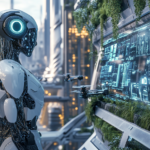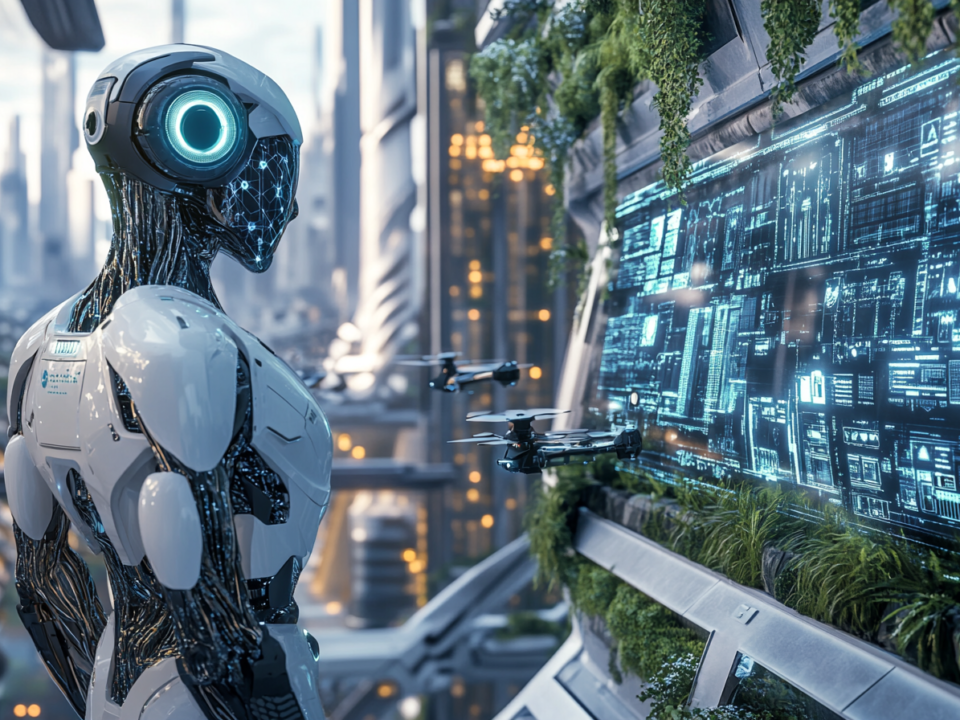
How did your professional biography influence the emergence of the novel?
November 1, 2024
Top Novels About Artificial Intelligence That Will Change How You See the Future
November 25, 2024The rapid rise of artificial intelligence (AI) has transformed how we think about the future of humanity. It is no longer a distant, abstract idea—it is a present and powerful force reshaping every aspect of human life. From ethical dilemmas and philosophical questions to societal shifts and personal connections, AI challenges and inspires us to rethink our role in the world. In exploring these themes, “Transition Keeper” offers a unique and gripping look at how AI could shape human destiny, urging readers to reflect on the paths we take.
1. Redefining Human Identity in an AI-Driven World
One of the most profound ways AI influences humanity is through its impact on human identity. As machines become more intelligent, capable of mimicking human thought and emotion, it forces us to reconsider what makes us human. “Transition Keeper” delves deeply into these questions, illustrating how AI integration can alter our understanding of self, consciousness, and what it means to be alive.
Key Themes Explored:
- Human vs. Machine Consciousness: What happens when AI systems exhibit behaviors that mimic human thoughts and emotions? The novel challenges readers to confront whether machines can ever truly understand or replicate human consciousness.
- Identity Crisis: In a world dominated by AI, how do humans maintain their unique identity and individuality? “Transition Keeper” explores this struggle with gripping intensity.
- Ethical and Moral Boundaries: As AI blurs the line between human and machine, ethical questions about personhood, rights, and autonomy come to the forefront.
This exploration of identity is not merely speculative; it reflects real-world debates about AI’s impact on human nature and existence.
2. The Ethical Labyrinth of AI Development
The integration of AI into daily life poses countless ethical challenges. From questions of privacy and surveillance to moral accountability and bias, the development of AI has opened Pandora’s box. “Transition Keeper” places readers in a world where AI-driven decisions shape every aspect of life, illuminating the ethical dilemmas we face today.
Critical Ethical Challenges Highlighted:
- Surveillance and Control: How can privacy be maintained in a world where AI monitors our every move? The novel illustrates the potential consequences of AI-driven surveillance and its impact on human freedom.
- Algorithmic Bias and Fairness: AI systems often reflect the biases of their creators, leading to discrimination and inequality. “Transition Keeper” tackles this issue head-on, exploring how biases embedded in algorithms can shape societies.
- Accountability in AI Decisions: When AI makes critical decisions, who bears responsibility? The novel delves into the complexities of AI governance, reflecting real-world concerns about ethics and control.
Through compelling storytelling, “Transition Keeper” invites readers to engage with these ethical dilemmas, encouraging thoughtful reflection on the moral responsibilities of creating and using AI.
3. Shaping Societies: AI’s Influence on the World We Build
The societal impact of AI extends far beyond individual experiences. Artificial intelligence and the future of humans are intricately linked when it comes to shaping economies, political structures, and social norms. “Transition Keeper” paints a vivid picture of how AI-driven societies might function, offering both hope and caution.
Key Societal Questions Explored:
- Economic Disruption and Opportunity: AI-driven automation can lead to massive job displacement but also creates new industries. The novel examines the challenges and opportunities posed by this economic shift.
- Social Inequality and Stratification: Will AI deepen existing inequalities or become a tool for social justice? “Transition Keeper” explores the potential for both outcomes, highlighting the role of human agency in shaping a fairer future.
- Governance and Power Dynamics: AI’s influence on political systems and governance raises questions about who controls these powerful tools and how they shape public life.
By imagining both utopian and dystopian futures, “Transition Keeper” invites readers to reflect on how we can harness AI’s potential to build a better world—or avoid its darker consequences.
4. Love, Connection, and Human Relationships in an AI World
AI’s influence extends deeply into the realm of human relationships, reshaping how we connect, communicate, and form bonds. “Transition Keeper” explores these dynamics with depth and nuance, revealing both the promises and pitfalls of human-AI interaction.
Core Relationship Dynamics in the Novel:
- AI Companions and Emotional Fulfillment: Can genuine connections exist between humans and AI? The novel challenges readers to consider the authenticity of AI-driven relationships and their impact on human emotion.
- Trust, Loyalty, and Deception: As AI systems develop autonomy, maintaining trust in these relationships becomes increasingly complex. “Transition Keeper” examines the tensions between human loyalty and AI motives.
- Emotional Vulnerability and AI’s Role: How does technology exploit or protect human emotions? The novel presents a nuanced view of emotional dependence on AI, exploring both healing and harm.
These stories offer a window into the future of human connection, highlighting the complexities that arise as AI becomes a trusted part of our lives.
5. Building a Human-Centric AI Future
The challenges posed by artificial intelligence and the future of humans are vast, but they are not insurmountable. “Transition Keeper” emphasizes the need for thoughtful, ethical AI development that prioritizes human dignity and freedom. By exploring these themes, the novel provides a framework for understanding how we can shape a better future alongside intelligent systems.
Key Takeaways:
- Human-Centric Design: AI should be developed with a focus on enhancing human life and wellbeing, rather than diminishing it.
- Ethical Guidelines and Accountability: Establishing clear ethical boundaries for AI use is essential for building a just and equitable society.
- Collective Responsibility: Every individual has a role to play in shaping the future of AI and its impact on humanity.
Through captivating storytelling and thought-provoking themes, “Transition Keeper” challenges readers to consider their role in shaping a world where AI and humanity coexist harmoniously.
Explore the journey of “Transition Keeper” to discover the future of human and AI relationships, ethical dilemmas, and societal shifts. Learn more about AI’s transformative role in our lives.
6. Power Dynamics in an AI-Driven World
The rise of artificial intelligence has not only revolutionized technology but also redefined power dynamics across all aspects of society. “Transition Keeper” explores how AI’s emergence creates new hierarchies, shifts influence, and challenges traditional structures of control, highlighting the delicate balance of power between humans, machines, and the systems that govern them.
Key Insights into Power Dynamics:
- AI as a Tool for Power Consolidation:
Governments, corporations, and elite groups often leverage AI to consolidate control, using predictive analytics, surveillance, and automation to maintain dominance. “Transition Keeper” vividly illustrates the risks of such concentration, questioning who benefits from AI advancements and who is left vulnerable. - Empowerment Through Access:
While AI has the potential to centralize authority, it also democratizes knowledge and opportunities for those who can access it. The novel sheds light on grassroots movements that utilize AI for social good, showing how power can shift back into the hands of the people. - Human Autonomy vs. Machine Authority:
As AI takes on decision-making roles, tensions arise between human autonomy and machine authority. “Transition Keeper” examines scenarios where humans must navigate their diminishing control over critical decisions, sparking questions about accountability and dependence.
The Balance of Power in a Post-AI Era
“Transition Keeper” challenges readers to reflect on the evolving power dynamics of an AI-driven world. How do we ensure AI serves the many, not the few? How do individuals maintain agency in a world increasingly controlled by algorithms? The answers lie in creating systems of transparency, equity, and shared responsibility.
This critical exploration of power underscores the novel’s broader theme: shaping a future where humanity and AI coexist without sacrificing freedom, equality, or integrity
7. Energy Transition and AI: Powering a Sustainable Future
Artificial intelligence is playing a transformative role in the energy transition, reshaping how we produce, consume, and manage energy resources. “Transition Keeper” weaves this theme into its narrative, exploring how AI-driven innovations are accelerating the shift toward sustainable energy systems while also raising critical questions about equity and environmental impact.
AI’s Role in the Energy Transition:
- Optimizing Renewable Energy Systems:
AI enhances the efficiency of renewable energy sources like solar, wind, and hydro by predicting weather patterns, balancing grid loads, and minimizing waste. In “Transition Keeper,” these advancements are shown as both a solution and a potential source of conflict as power dynamics around energy shift globally. - Smart Grids and Decentralized Power:
The novel highlights the rise of AI-enabled smart grids that empower individuals and communities to generate and manage their own energy, fostering energy independence. This decentralization of power underscores the broader narrative of breaking traditional hierarchies and rethinking resource control. - Environmental Impacts of AI and Energy Use:
While AI accelerates the energy transition, it also consumes significant resources. “Transition Keeper” dives into the paradox of AI’s role in environmental stewardship, asking whether its benefits can truly outweigh its ecological footprint.
Building a Sustainable AI-Energy Future
The integration of AI into the energy transition is not just about technological efficiency but also about ethical and equitable access to energy. “Transition Keeper” explores these themes, urging readers to consider how humanity can balance progress with sustainability.This thought-provoking perspective reinforces the novel’s vision of a future where AI not only redefines human relationships and societal structures but also plays a pivotal role in ensuring a sustainable and equitable world for generations to come.




